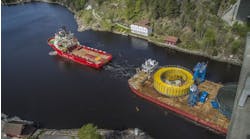Offshore staff
HOUSTON – Nine international oil and gas operators have joined forces to support research into oil spill prevention and response in Arctic regions.
The Arctic Oil Spill Response Technology joint industry program (JIP), formed under the auspices of the London-based International Association of Oil and Gas Producers (OGP), has established technical working groups to manage 10 research projects in the areas of dispersants, trajectory modeling, remote sensing, mechanical recovery, and in-situ burning.
Arctic spill research, particularly in mechanical recovery methods and in-situ burning, goes back four decades. But growing interest in arctic exploration has revealed what program manager Joseph Mullin describes as “gaps” in the industry’s spill response arctic region capabilities and knowledge.
“We looked at the existing research, and gaps, and focused on the latter,” Mullin toldOffshore after a presentation at the Arctic Technology Conference in Houston.
The JIP, officially launched in January 2012, has a budget of roughly $21 million to fund four years of work. “We believe that’s appropriate, based on other joint industry research projects in the area ofoil spill response over the last 10 years or so,” Mullin said.
The project began coming together in 2009, more than a year before the Macondo disaster in the Gulf of Mexico. That event leant urgency to the JIP’s work, as well as a wealth of real-time emergency knowledge, said Becky Silves, chair of the JIP and an emergency response coordinator with ConocoPhillips.
Among the significant lessons learned from Macondo was the effectiveness of dispersants, which were used extensively during the 2010 spill response and cleanup.
“The water temperature in deepwater is very similar to Arctic waters, so you have a lot of data that you can extrapolate and leverage to be able to understand how (dispersants) would work in Arctic waters,” Silves said.
The Arctic JIP is collaborating closely with the Joint Industry Task Force set up after Macondo as well as a spill response group set up by the OGP’s Global Industry Response Group, she added.
The JIP claims to be the largest pan-industry program dedicated to spill response, with support from BP, Chevron, ConocoPhillips, Eni, ExxonMobil, North Caspian Operating Co., Shell, Statoil, and Total.
“One oil spill impacts all companies, so you can accomplish a lot more working together,” Mullin said.
12/05/2012


